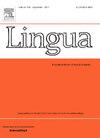影响波多黎各西班牙语词尾/n/化的语言因素
IF 1.3
3区 文学
0 LANGUAGE & LINGUISTICS
引用次数: 0
摘要
加勒比地区长期以来一直是各种方言特征的研究对象。波多黎各记录了许多这样的现象,包括/r/后置动词的/s/的发音或删除,以及/n/词尾的velarization。虽然广泛指出这是波多黎各西班牙语的一个特点,但最近没有完成对后一种现象的数量研究。目前的研究测量了波多黎各西班牙语中有利于词尾/n/化的语言限制。本文采用基于用法的方法(UBA)对该方言的词尾化进行了实证研究。使用Rbrul对988个标记进行了语言因素的多元统计分析。这些代币取自波多黎各广播节目的录音语料库,并在PRAAT中进行分析。该研究测量和权衡了有利于词性/词性/词性化的因素,分析了语言内部因素,而没有分析社会因素。结果表明,有利于词尾/词尾/词尾化的语境是以下分词和单词重音。这个结果是使用语言表示的范例模型框架来定位的。本文章由计算机程序翻译,如有差异,请以英文原文为准。
Linguistic factors that condition the velarization of word final /n/ in Puerto Rican Spanish
The Caribbean has long been the subject of study for various dialect features. Many of these phenomena have been documented in Puerto Rico, including aspiration or deletion of /s/ velarization of /r/ postposition of the verb and velarization of word-final /n/. Although widely noted to be a feature of Puerto Rican Spanish, no recent quantitative study has been completed on the latter phenomenon. The current study measures the linguistic constraints that favor velarization of word-final /n/ in Puerto Rican Spanish. It empirically studies word-final /n/ velarization in this dialect with a Usage-Based Approach (UBA). A multivariate statistical analysis of linguistic factors is done using Rbrul on 988 tokens. The tokens were taken from a corpus of a recorded Puerto Rican radio program and analyzed in PRAAT. The study measures and weighs factors that favor word-final /n/ velarization, analyzing language-internal factors and no social factors. The results show the context that favors word-final /n/ velarization is the following segment and word stress. This result is situated using the framework of the exemplar model of language representation.
求助全文
通过发布文献求助,成功后即可免费获取论文全文。
去求助
来源期刊

Lingua
Multiple-
CiteScore
2.50
自引率
9.10%
发文量
93
审稿时长
24 weeks
期刊介绍:
Lingua publishes papers of any length, if justified, as well as review articles surveying developments in the various fields of linguistics, and occasional discussions. A considerable number of pages in each issue are devoted to critical book reviews. Lingua also publishes Lingua Franca articles consisting of provocative exchanges expressing strong opinions on central topics in linguistics; The Decade In articles which are educational articles offering the nonspecialist linguist an overview of a given area of study; and Taking up the Gauntlet special issues composed of a set number of papers examining one set of data and exploring whose theory offers the most insight with a minimal set of assumptions and a maximum of arguments.
 求助内容:
求助内容: 应助结果提醒方式:
应助结果提醒方式:


